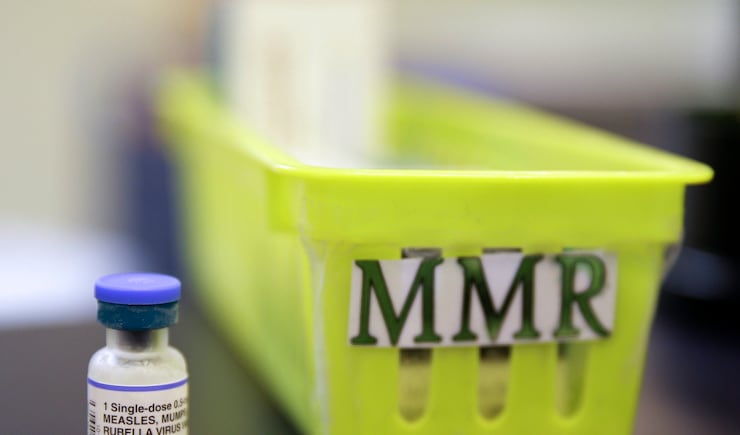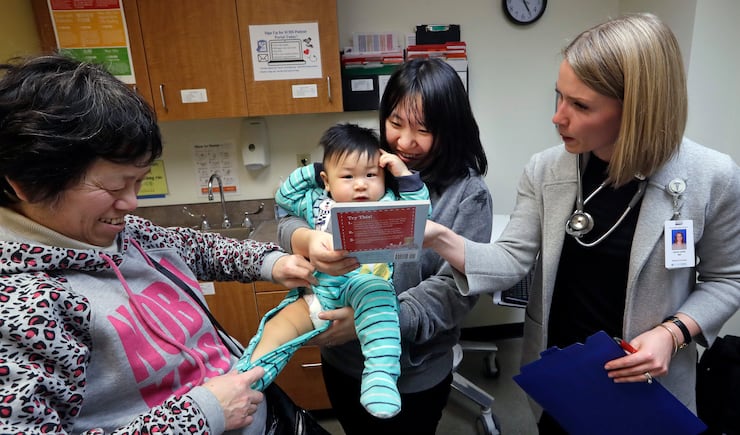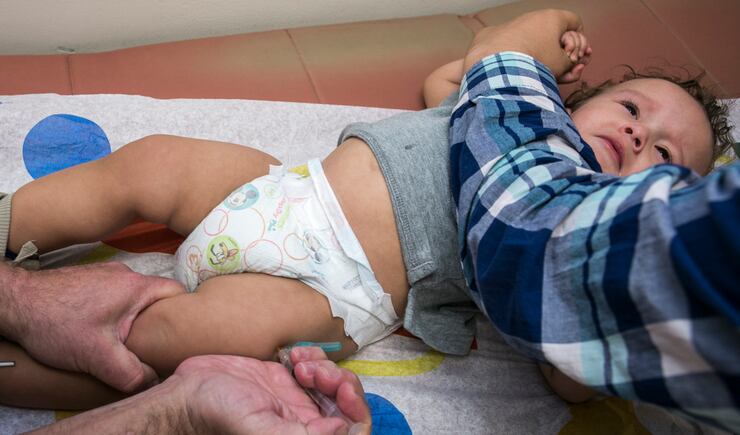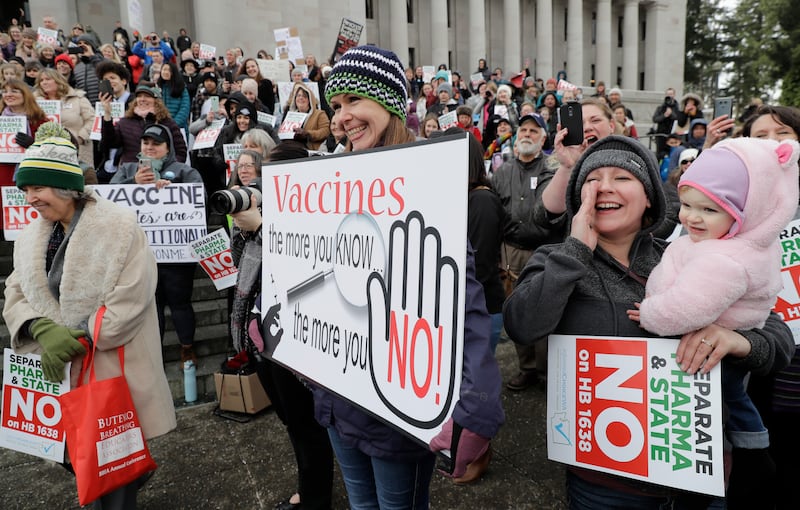SALT LAKE CITY — The majority of Americans have positive attitudes about the measles, mumps and rubella (MMR) vaccine, but some groups are more concerned about risks than others, according to a new Pew Research Center report, which indicates it’s not politics that divide U.S. opinion on vaccinations, but race, age, income level and education.
Overall, 88% of U.S. adults think positively of the MMR vaccine, saying the benefits outweigh the risks. However, black and Hispanic Americans are more likely to say MMR vaccine risks are high and preventive health benefits are low. People who are younger, poorer and less educated also tend to express more skeptical attitudes of the vaccine, according to the Pew report.
The report, which was based on an October 2019 survey of 3,627 U.S. adults, sheds new light on what groups might be resistant to vaccinations at a time when measles cases are on the rise.
Last year, the United States saw the highest number of people contract measles in more than a quarter of a century, according to the U.S. Centers for Disease Control and Prevention. The majority of cases were tied to outbreaks in New York, especially among Orthodox Jews who may oppose vaccines for religious reasons, but 30 other states also saw people fall ill. The CDC reports that outbreaks are more common where groups of people are unvaccinated.
“This is an area where a small share of Americans with more skeptical views can have an outsized impact on public health,” said Cary Funk, director of science and society research at Pew Research Center.
The Pew report introduces some new data about the types of people who oppose vaccinations, according to Litjen Tan, chief strategy officer for the Immunization Action Coalition. The stereotype of a person who opposes vaccines is a high-income, university educated soccer parent, Tan said.
But in recent years, the vaccine debate has become more focussed on parental rights, perhaps changing the types of people who are attracted to the messaging, he said.
“Whose right is it to vaccinate? Is it the societal right to say you need to get vaccinated in order to go to school, or is it the parental right to say, ‘you can’t make me’?” said Tan.
People in the lower socioeconomic strata could be more sensitive to arguments that “big government is messing with you,” according to Tan. In addition, racial minorities may be more likely to want to make the decision of vaccination for themselves because of a history of mistreatment by the medical community. “Unfortunately, that perception still persists today,” he said.
Risks and benefits
In the decade before the measles vaccine became available in 1963, virtually every child got the illness and an estimated 400-500 people died every year in the U.S., according to the CDC. Thanks to high vaccination rates, only one person has died from measles in the U.S. in the past five years, but in other countries, measles continues to take lives. 2018 saw more than 140,000 deaths worldwide in countries like Democratic Republic of Congo, Liberia, Madagascar, Somalia and Ukraine.
Samoa recently lifted a six-week state of emergency after a measles outbreak killed 81 people, including many children. The United Nations Children’s Fund reported that the cause was plummeting vaccination rates “largely due to misinformation and mistrust among parents.”



Claims about the vaccine’s links to autism, stemming from a debunked study from 1998, or other life-threatening conditions are not supported by the scientific community. But there are some acknowledged risks associated with the MMR vaccine, Rich Lakin, immunization program manager in the Utah Department of Health, said. The CDC website lists fever, mild rash and temporary pain and stiffness in the joints as common side effects. It also says the MMR vaccine has been linked to “a very small risk of febrile seizures,” but such seizures are not associated with any long-term effects.
“The data suggests that a severe allergic reaction is one in a million,” said Lakin. “So if everyone in Utah went out and got the vaccine right away, you’d have three people that could have a severe allergic reaction. That’s pretty amazing.”
When Pew asked if the benefits of the MMR vaccine outweigh the risks, 92% of white Americans said yes. But 78% of Hispanic and 74% of black Americans said the same. And while 23% of white adults rated the risk of side effects from the vaccine as “at least medium,” the numbers were 45% for Hispanic adults and 46% for black adults, according to the survey.
People with different educational backgrounds, income and age also viewed the stakes differently. For example, 93% of Americans with a postgraduate degree said the health benefits of the MMR vaccine are “very high or high,” compared to 68% of people with a high school degree or less.
Parental rights
Sandy Marra, 42, is a nutritionist and mother of four from Chagrin Falls, Ohio. She calls herself a “former vaxer” and has vowed that her kids will never receive another vaccine.
“No one can say vaccines don’t come with a risk. Everyone acknowledges vaccines can cause harm. I think the dispute is how much,” Marra said.
“And where there is risk, there must be a choice,” she said.
After Marra got a vaccine at age 21, she experienced partial paralyzation of her face that lasted for about a month. She also developed an autoimmune disease. Her first child received scheduled immunizations as an infant and developed a variety of health issues including acid reflux, asthma, eczema, seizures and speech issues. While Marra has no scientific proof that her symptoms or her son’s symptoms were caused by the vaccinations, she feels strongly that they were because of the timing. Her younger three kids have not received any vaccinations and are much healthier, she said.
“I do not believe in vaccines at all,” said Marra. “I know so many families that have had the same results.”
Daniel Salmon, director of the Institute for Vaccine Safety at Johns Hopkins University, said it’s “a natural human fallacy” to assume because one thing happens after the other that there is a causal relationship. “If I vaccinated everyone today with saline (a solution of salt water), everything bad that happens tomorrow could be perceived as happening because of the vaccine.”
Public school requirements
Marra has had no problems enrolling her kids in public school in Ohio, where exemptions to vaccine requirements for personal and religious reasons are allowed.
She said it “terrifies” and “angers” her to see states like New York and Maine that have recently passed legislation to eliminate exemptions to vaccination requirements based on anything other than medical reasons.
Marra’s opposition to vaccines is based mainly on personal experience but also has a religious element. She says “God gave us an immune system; God gave us great food and herbs to guard against illness.”
The fact that the gelatin contained in vaccines is derived from pig products is sometimes a concern for religious people that stay away from pork, like Orthodox Jews. But no major religion formally prohibits vaccination, and the leaders of most large religious groups have advised their members to get immunized, according to Pew’s report.
Majorities across religious groups support public school requirements for the MMR vaccine, according to Pew. White evangelical Protestants are the most opposed to requirements, with 20% saying parents should be able to decide whether to have their children vaccinated — even if that means creating health risks for others. That’s compared to 11% of mainline Protestants who said the same.
“There are also modest differences by political party, with Republicans (including independents who lean to the GOP) somewhat more likely than their Democratic counterparts to say parents should be able to decide whether to vaccinate their children,” the Pew study says.
“The vaccine debate is about parental rights, and the parental rights issue is not necessarily Republican or Democrat,” said Tan, who supports laws that limit vaccine exemptions for philosophical reasons. “I don’t think there is a political pigeonhole you can put that into.”





